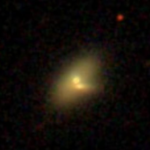Difference between revisions of "Intern program for college students"
Jump to navigation
Jump to search
| Line 1: | Line 1: | ||
==[[Photometry of overlapping galaxy pairs]]== | ==[[Photometry of overlapping galaxy pairs]]== | ||
[[File:overlapping_pair.png|150px|right]] | |||
:advisor: Shiyin Shen[http://cluster.shao.ac.cn/~shen/] | :advisor: Shiyin Shen[http://cluster.shao.ac.cn/~shen/] | ||
:collaborator: Shuai Feng (postgraduate student) | :collaborator: Shuai Feng (postgraduate student) | ||
Galaxy pair is a kind of self-gravitational system, which contains two member galaxies. Because of simplest configuration, galaxy pairs are very useful to study the interaction effect, such as merge, tidal force, dynamic fiction. However, projected effect often causes overlapping in galaxy pairs, especially in compact pairs. That seriously biases photometric parameters due to comtamination of each star light. How to get rid of overlapping influence has become a very important task. | |||
==Spectral Energy Distribution (SED) of Brown Dwarfs== | ==Spectral Energy Distribution (SED) of Brown Dwarfs== | ||
Revision as of 11:11, 21 April 2015
Photometry of overlapping galaxy pairs
- advisor: Shiyin Shen[1]
- collaborator: Shuai Feng (postgraduate student)
Galaxy pair is a kind of self-gravitational system, which contains two member galaxies. Because of simplest configuration, galaxy pairs are very useful to study the interaction effect, such as merge, tidal force, dynamic fiction. However, projected effect often causes overlapping in galaxy pairs, especially in compact pairs. That seriously biases photometric parameters due to comtamination of each star light. How to get rid of overlapping influence has become a very important task.
Spectral Energy Distribution (SED) of Brown Dwarfs
- advisor: Zhengyi Shao
Searching of cluster structures in multiple sky survey data
- advisor: Zhengyi Shao
